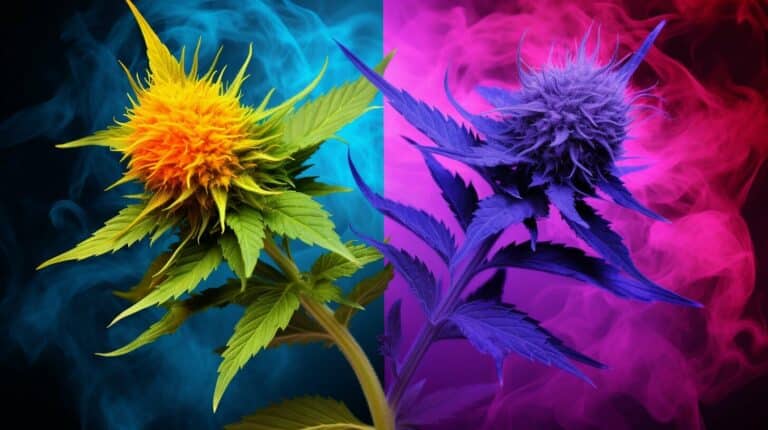Is Delta-11 THC Legal in Texas? Understanding the State’s Stance on Cannabinoids
Keeping up with ever-shifting cannabis laws is no small feat, especially as fresh strains pop up on the scene. If you’re curious about Delta-11 THC, also dubbed 11-hydroxy-THC, a powerful twist on THC that packs a punch stronger than your usual Delta-9 THC in regular marijuana, set your sights on Texas. This state is seeing major legal shake-ups, especially around hemp-based goodies.
Table of contents
Texas’s stance on hemp and its derivatives pivots on their THC content. Since hemp was federally legalized, the state has been aligning with federal guidelines which permit the legal use of hemp derivatives as long as they contain less than 0.3% Delta-9 THC. However, this threshold doesn’t explicitly mention Delta-11 THC, leading to ambiguities. While CBD, a non-psychoactive compound from hemp, is clearly legal, the status of other cannabinoids, including Delta-11 THC, can be less straightforward.
The legality of Delta-11 THC in Texas is a nuanced subject that often intersects with the treatment of other THC isomers, such as Delta-8 and Delta-10 THC. As legal interpretations evolve, examining the legislative approach to these similarly positioned compounds could provide insight into your understanding of Delta-11 THC’s current status. Keep in mind, regulations are frequently updated, so it’s crucial to stay informed about the latest legal developments affecting cannabinoids in Texas.
Overview of Hemp and Its Derivatives
In exploring the legal landscape of hemp and its derivatives, you’ll gain insight into the nuances of federal legislation and the specific effects of compounds like cannabidiol (CBD). Understanding these elements is crucial as you navigate the complex regulations surrounding the use of hemp products.
Understanding the Cannabis Plant
The cannabis plant comprises two primary species: hemp and marijuana. Both produce cannabinoids, but hemp is legally defined as having a delta-9 tetrahydrocannabinol (THC) concentration of 0.3% or less on a dry weight basis. Beyond THC, the plant yields over 100 cannabinoids, which include CBD, known for its potential therapeutic benefits without the psychoactive effects commonly associated with marijuana.
Federal Legal Framework
Hemp was federally legalized in the United States with the passing of the 2018 Farm Bill. This landmark legislation removed hemp, defined by its low THC levels, from the list of controlled substances, carving a new avenue for the cultivation and sale of hemp-derived products. Federal law now permits the wide-scale production of hemp and its derivatives, provided they adhere to the stipulated THC threshold, making them federally legal.
Cannabidiol and Its Effects
Cannabidiol, commonly referred to as CBD, is a prominent non-psychoactive compound found in the hemp plant. Its popularity has risen due to its association with various health benefits, including the potential to alleviate anxiety and improve sleep. However, even though CBD is federally legal when derived from hemp, the varying degrees of regulation at state levels can complicate its legal status.
Delta 11 THC Specifics
Understanding the chemical profile of Delta 11 THC and its health considerations is vital if you’re curious about its legal status in places like Texas.
Chemical Profile of Delta 11 THC
Delta 11 THC, or 11-hydroxy-THC, is a psychoactive compound found in cannabis. It is a metabolite of Delta 9 THC, the primary compound that produces psychoactive effects. Unlike its naturally occurring counterpart, Delta 11 THC is often formed in the body after the consumption of cannabinoids. It’s worth noting that hemp-derived products can contain various THC isomers, but the THC content is legally required to stay under 0.3% to meet federal legal standards.
Health Considerations
When you consume cannabinoids, safety should always be a priority. Delta 11 THC has been associated with potent psychoactive effects that can be stronger than Delta 9 THC. It’s crucial to be aware that consumption might lead to hallucinations, vomiting, or even loss of consciousness. The Centers for Disease Control and Prevention (CDC) cautions about synthetic THC products, which can be unpredictable and lead to severe health issues. Always ensure that any cannabinoid product you use, especially those containing synthetic THC, complies with safety regulations to mitigate these risks.
State Law and Regulations in Texas
In Texas, your understanding of the legality of cannabinoids like Delta-11 THC hinges on state law and the Texas Department of State Health Services’ regulations. Below, you’ll find the details of House Bill 1325 which set the precedent for hemp product regulation, and learn about the enforcement role the DSHS plays.
House Bill 1325 and Texas Regulation
House Bill 1325, passed in 2019, was a landmark moment for hemp products in Texas. This bill differentiates legal hemp from marijuana based on tetrahydrocannabinol (THC) levels, considering hemp products with a THC concentration of not more than 0.3 percent on a dry weight basis as legal. For retailers and consumers, this has established a threshold for the legality of hemp-derived products.
Texas Department of State Health Services’ Role
The Texas Department of State Health Services (DSHS) holds the authority to regulate consumable hemp products (including cannabinoids). This involves setting the standards for manufacturing, processing, distribution, and retail sale of these products. The DSHS also publishes guidelines and updates on regulations, playing a pivotal role in interpreting the legal landscape for Delta-11 THC and other cannabinoids post the enactment of House Bill 1325.
Legality of Delta 11 THC in Texas
When you’re considering the legal status of Delta 11 THC in Texas, it’s crucial to understand the nuances of both state and federal laws regarding cannabis and its derivatives. As of now, Texas law adheres to the federal definition of hemp, which is cannabis containing less than 0.3% Delta-9 THC on a dry weight basis.
- Federal Level: Cannabis and most of its psychoactive compounds are classified as Schedule I controlled substances.
- State Laws: While Texas has legalized hemp, the legal status of Delta 11 THC – a lesser-known cannabinoid – remains complex.
In terms of enforcement, there’s no explicit mention of Delta 11 THC in Texas statutes. However, cannabinoids derived from marijuana, which might include Delta 11 THC, could be deemed illegal drugs under Texas law, unless they fall within the definition of hemp, which focuses solely on the concentration of Delta-9 THC.
Texas allows legal use of medical marijuana under the Texas Compassionate Use Act, but this is strictly limited to low-THC cannabis for certain medical conditions. It’s important to note that:
- Recreational cannabis is illegal in Texas.
- Cannabis extracts outside the definition of hemp could be subject to drug laws.
To err on the side of caution, always verify the legality of specific compounds such as Delta 11 THC with local regulations before possession or use. Remember, regulatory landscapes can shift, and while this cannabinoid isn’t explicitly mentioned, its association with psychoactive properties could influence its legal status.
Legal Status in Other States
Understanding the legal landscape of hemp-derived products, like delta-8, is crucial as it varies significantly from one state to another. It’s important for you to be aware of how these laws compare, especially if you’re considering the purchase or sale of these substances.
Comparison with Neighboring States
Arkansas and Louisiana neighbor Texas and have their own specific regulations. Arkansas views delta-8 as a controlled substance, making it illegal. In Louisiana, it’s a bit more complex as delta-8 is legal if it’s derived from hemp and falls within the federal guidelines of containing less than 0.3% delta-9 THC by dry weight.
In Colorado, despite its liberal stance on cannabis, delta-8 is not legally permitted due to the state’s definition of hemp which excludes synthetically derived tetrahydrocannabinol. Similarly, Kansas aligns with federal law and prohibits all forms of tetrahydrocannabinol, including delta-8.
Variations in State Regulations
The situation is different in states like Kentucky, Maine, and Maryland, where the legal status can be quite intricate. Kentucky law strictly prohibits all products with any tetrahydrocannabinol, including delta-8. Conversely, Maine and Maryland maintain a more accepting approach, allowing the sale of delta-8 products, provided they comply with federally mandated THC limits.
Out west, California has embraced a legal framework similar to federal law, legally recognizing hemp products, such as delta-8, if they contain under 0.3% delta-9 THC. But crossing into Idaho, you’ll find some of the strictest regulations—any and all forms of THC, including delta-8, are illegal.
The landscapes change as you go further; Ohio, Virginia, and North Carolina have legalized delta-8 under specific restrictions, aligning closely with federal regulations on hemp-derived products. Meanwhile, Nebraska and Washington have their own unique stipulations on the legality of delta-8.
As these laws are subject to change, ensuring you’re up to date with state law governing hemp products and their legality is key to navigating the complex realm of substances like delta-8.
Commercial Impact in Texas
As you navigate the complex landscape of Delta-8 THC’s legal status in Texas, it’s important to understand its implications on local businesses and the economy.
Impact on Retailers
Retailers in Texas have experienced a significant shift due to changes in Delta-8 THC’s legal status. After the legalization of hemp, Delta-8 THC products—ranging from gummies to candies—grew in popularity due to their federally legal status derived from hemp. However, you might notice that these retailers face constant ambiguity regarding state laws versus federal law, making it challenging to maintain consistent sales and inventory.
Legal Challenges and Market Responses
Legal disputes have led to a rollercoaster for the market. For instance, Hometown Hero, a local manufacturer, took legal action, resulting in a temporary injunction allowing continued sales of their products. This resonates with the customers, who appeal to the perceived legality of their favorite hemp products. Due to such legal challenges, you might observe retailers and customers navigating a fluctuating landscape of product availability and legality, pending further regulation and judicial clarification.
Consumer Safety and Guidance
When considering the legality of substances such as Delta-8 or other cannabinoids in Texas, your safety and adherence to regulations must be your priority. It is imperative that you, as a consumer, stay informed about the safety profiles of these products and understand the recommendations for their responsible use.
Products and Consumer Safety
Before purchasing or using smokable hemp products that may contain cannabinoids like Delta-11, you should verify if the product is FDA-approved and compliant with state regulations. In Texas, the safety of consumer products is a significant concern, especially because some cannabinoid products may remain unregulated. Always read the label carefully to ensure that the product meets safety standards and doesn’t contain substances classified as controlled. The lack of regulation can also mean varying quality, so it is crucial to buy from reputable sources.
- Checklist for Safety:
- FDA-approved?
- Complies with Texas regulations?
- Clearly labeled?
- Purchased from a reputable source?
Recommendations for Responsible Use
If you choose to use cannabinoids like Delta-11, it’s important to do so responsibly. Here are some guidelines to help ensure your safety as a customer:
- Start with a low dose: Especially if you are new to these products, begin with a small amount to assess your tolerance.
- Understand the effects: Research and educate yourself on what effects to expect.
- Legal age: Ensure you are of legal age to purchase and consume such products.
- Follow state law: Stay up-to-date with Texas laws regarding smokable hemp and cannabinoids to ensure you’re consuming legally.
Being informed and cautious will help safeguard your health and ensure you remain on the right side of the law. Remember, regulations are in place to protect you, the consumer, so adhering to them is for your own safety.
Future Outlook and Legislative Movement
Your understanding of Delta-11 and its standing in Texas is critical, given the evolving landscape of cannabis-related legislation. This section explores potential shifts in regulatory frameworks and advancements in cannabis research that could influence Delta-11’s legal status.
Potential Legislation Changes
In Texas, Delta-11, like its cannabinoid counterparts, is subjected to state laws that are influenced by federal regulations. While Delta-11 is not specifically mentioned, its classification often falls under the umbrella of hemp-derived cannabinoids. Current Texas law permits the sale of hemp-derived extracts, including CBD, provided they contain no more than 0.3% THC on a dry weight basis.
- Legality: Texas could modify its cannabis regulations, potentially affecting the legal status of Delta-11.
- State Laws: Watch for bills proposing amendments to the Texas Controlled Substances Act, which could result in tighter or more relaxed controls over Delta-11 and other cannabinoids.
Moving forward, you should be vigilant for notices from the Texas Legislature regarding cannabinoid laws, as changes regarding the larger category of cannabis could implicitly include Delta-11.
Advancements in Cannabis Research
Cannabis research is gaining momentum, offering a deeper understanding of cannabinoids like Delta-11. Such new information may sway state laws and federal law regarding the legal classification and allowed uses of these substances.
- Medical Marijuana: Ongoing studies may highlight therapeutic benefits of Delta-11, potentially impacting its legal status, especially under Texas’s Compassionate Use Program, which governs medical marijuana.
- Recreational Marijuana: While Texas has not legalized recreational marijuana, continuous research and shifts in public opinion could lead to future legislative considerations.
It’s important for you to keep track of such research, as its outcomes can play a significant role in shaping the discourse around the legality and regulation of cannabinoids in Texas.
Frequently Asked Questions
In this section, you’ll find precise and up-to-date answers to common inquiries about the legal intricacies surrounding Delta-11 THC in Texas.
What is the legal status of Delta-11 THC in Texas?
Delta-11 THC, like all isomers of THC, falls under a legal grey area in Texas. While hemp-derived compounds with less than 0.3% Delta-9 THC are legal, the specific status of Delta-11 THC hasn’t been clearly addressed by state legislation.
Are there any recent updates on the legality of Delta-8 THC in Texas?
As of the latest information, Delta-8 THC faces legal challenges in Texas, with its status being contentious. Officials have attempted to classify it similarly to Delta-9 THC, but legal proceedings complicate the matter.
Does the legality of hemp in Texas extend to all cannabinoids derived from it?
The legality established for hemp in Texas extends to cannabinoids, including Delta-11 THC, provided they contain less than 0.3% Delta-9 THC by dry weight. However, the law doesn’t explicitly regulate every minor cannabinoid, so interpretations can vary.
Can the use of Delta-11 THC lead to a positive drug test?
Yes, the use of Delta-11 THC can potentially lead to a positive drug test. Tests often look for metabolites common to various THC compounds, not just Delta-9 THC.
Is Delta-11 considered to have a higher potency compared to other THC variants?
The potency of Delta-11 THC compared to other variants like Delta-9 or Delta-8 is not well documented. Potency can vary based on individual biochemistry and the specific product formulation.
What are the legal consequences of possessing Delta-9 THC in Texas?
Possessing Delta-9 THC in Texas beyond the legal limit of 0.3% is illegal. It can result in criminal charges, ranging from misdemeanors to felonies, depending on the amount possessed.







